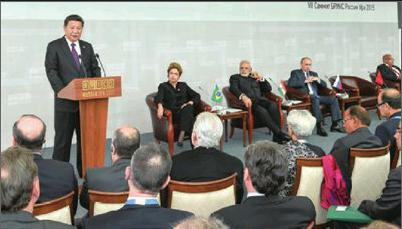Emerging Among Skepticism
2015-07-22ByBaiShi
By+Bai+Shi

Six years after its inception, the BRICS group of the worlds five major emerging economies—Brazil, Russia, India, China and South Africa—again held its highest-level meeting in Russia, its place of birth. Ufa, capital of Russias inland Bashkortostan Republic, hosted the Seventh BRICS Summit on July 8 and 9.
The First BRIC Summit was held in Russias Yekaterinburg in 2009, which had participation of leaders from Brazil, Russia, India and China. It turned an economic idea raised in 2001 by Jim ONeill, then chief economist of investment bank Goldman Sachs, into a full-fledged organization. Due to their strong economic growth in particular, the countries became the new driving force of the world economy after the financial crisis in 2008.
BRIC turned to BRICS after South Africa formally became a member in 2010. Today, BRICS has become a major player in global economic governance, as their GDP accounts for over 20 percent of the world total.
At the Ufa summit, BRICS members reached broad agreements on building a closer economic partnership and forging a community of shared interests. They also agreed to enhance cooperation on a series of global issues including the UNs post-2015 sustainable development agenda, climate change and reforming international financial institutions.
Growth prospects
However, worries have been mounting as BRICS economic growth has slowed down in the last two years.
China, the fastest-growing economy in BRICS, is adapting itself to slower growth rate. According to data released by Chinas National Bureau of Statistics, in 2012-14, the countrys annual GDP growth rate was about 7.5 percent on average, a sharp drop from near 10 percent between 2002 and 2011. This year, the Chinese Government sets its target for GDP growth at 7 percent.
As for Russia and Brazil, commodity exports, which are a major source of their state revenues, have been on a drastic decline in recent years. The slump in international oil prices has hurt the Russian economy badly. Meanwhile, Brazil suffers from shrinking international demands for iron ore and agricultural goods, its major exports.
India and South Africa are also facing different economic challenges.
Against this backdrop, some skeptics have begun to question BRICS role in boosting the global economic growth.
The theme of the Ufa summit is BRICS partnership: A powerful factor for global development, which officials and observers say represents a challenge to skeptics of the emerging groups role on the international stage.
“Currently, there is a lack of momentum for world economic recovery. Developed economies are not united in macroeconomic policies. The international market is influenced by drastic fluctuations, and prices of commodities are weak. All these negative factors affect the growth of BRICS economies,” Chinese Vice Foreign Minister Cheng Guoping said at a news briefing in Beijing on July 6.
According to Cheng, BRICS countries are taking steps to adjust their economic structures for transitions. “So the slowdown of growth in this sense is desirable and periodic,” he noted. “Despite slower GDP growth, BRICS countries have maintained faster development than most other economies in the world. I believe that BRICS countries will continue to be an important powerhouse for global economic growth in the future. After necessary reforms, they will embrace bigger opportunities.”
Chengs remarks were echoed by Wang Youming, Director of the Department for Developing Countries Studies under the China Institute of International Studies.
“Compared with developed economies, BRICS countries have greater development potential and will contribute more to the world economy in the long term,” Wang told the Xinhua Daily Telegraph, a Beijing-based daily.
Parts of a whole
Since the First BRIC Summit in 2009, the world has remained suspicious as to how beneficial the emerging group will be. After all, each BRICS member differs greatly from the others in terms of political systems, economic structures and national interests.
“Over the past years, BRICS countries have established a mechanism and platform for their cooperation and achieved some results,” Chinese Ambassador to Russia Li Hui said in a pool interview with the Chinese press on July 7.
For example, China has inked a good many deals with Russia, including big oil and natural gas supply contracts. Brazils leading aircraft manufacturing company Embraer Commercial Aviation has grabbed a big share of Chinas regional aircraft market, and China-produced subway trains have been exported to Brazil. Chinas economic ties with India and South Africa have also consolidated.
Li stressed that BRICS countries have unique advantages in bilateral and multilateral cooperation as their economies are highly complementary. More notably, they all have growing markets.
Currently, BRICS countries combined imports and exports account for 16 percent of the global trade, but trade between the five countries only amounts to $336 billion, 1.5 percent of the global total. “It leaves a lot to be desired,” Li said.
“After the 2008 financial crisis, major developed countries have failed to lead a global recovery. Under such circumstances, developing economies must enhance their cooperation, especially BRICS countries,” Fan Yongming, Director of BRICS Studies Center at Shanghai-based Fudan University said to Xinhua Daily Telegraph.
New bank
A week ahead the Ufa summit, the Standing Committee of the National Peoples Congress, Chinas top legislature, ratified an agreement on establishing the BRICS New Development Bank (NDB) that was signed by BRICS finance ministers in Fortaleza, Brazil, on July 15, 2014.
So far, legislative bodies of all BRICS countries have approved the agreement, providing a legal guarantee for the new bank to begin operation in January 2016.
According to the Fortaleza Declaration, the NDB, to be headquartered in Chinas Shanghai, aims to finance infrastructure and sustainable development projects in BRICS and other emerging and developing economies. It will have an initial authorized capital of $100 billion. The initial subscribed capital will total $50 billion, equally shared among founding members. The bank will also set up an African regional center in South Africa, which will be established concurrently with the headquarters.
Veteran Indian banker Kundapur Vaman Kamath has been appointed first president of the NDB.
The NDB will offer strong financial backing for BRICS countries economic development, Li said.
Shen Chen, a scholar of China studies at University of Stellenbosch, South Africa, said though BRICS countries have different economic strengths, they are equal in the upcoming new bank.
“The NDB aims to offer loans to infrastructure construction and industrial development in developing countries without any political conditions. It will complement the inadequacy of current financial institutions and facilitate growth in developing countries,” Shen said.
Shen believes the NDB is just the beginning of BRICS cooperation in building a reasonable and equal international economic order. Their concerted efforts will bring a remarkable change to global financial governance, he said.
